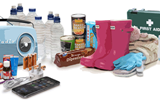
We never know when an emergency is going to occur but we can be prepared.
Having essential items ready can really help whether you are advised to stay in or you need to evacuate your home.
But when an emergency situation is actually happening it can be hard to think clearly about what you need and how to locate it quickly.
We have prepared some advice on what you might need in your home, in your car or what to take with you in an emergency pack or grab bag, when you are on the move.
In the event that you may have to leave your home quickly, it is important to have basic necessities to hand. The emergency services might not be able to reach you straight away and you may have to support yourself and your family for some time.
We have listed some of the items that you may want to include, although it's always important to tailor your kit to you and your family's individual needs.
For the home
- First aid kit including items such as waterproof plasters, bandages, a thermometer, antiseptic, eyewash solution, sterile dressings and gloves, medical tape for dressings, and tweezers.
- Hand sanitiser and wet wipes for hygiene purposes when the water is off.
- Essential medication.
- Portable power bank (fully charged) for charging your mobile phone.
- Mobile phone and charger for if you are evacuated
- Torch and batteries or a wind-up torch.
- Portable radio and batteries or a wind-up radio to get updates in a power cut
- Important documents including passports, driving licence, medical information and insurance documents in a waterproof bag.
- List of emergency contact numbers. This should be a paper copy, in case your mobile phone loses power.
- Spare glasses or contact lenses
- Basic toiletries including soap, toothpaste, toothbrushes, hair brush.
- Bottled water - A minimum of 2.5 to 3 litres of drinking water per person per day is recommended by the World Health Organisation for survival.
- Tinned food and a manual tin opener and other non perishable food in cartons and packets
- Warm clothes and blankets.
- Spare keys to your home and car.
- If you have young children and babies include their food, snacks bottles and favourite toys .
- A checklist of what to do before you leave - such as turn off the gas and electricity at the mains, close windows and ensure all doors are locked.
- Note pad, pens or pencils, whistle and a pen knife.
Year-round essentials
- A fully charged mobile phone and charger.
- A wind-up radio or battery operated radio and batteries.
- An in-car phone charger or power pack.
- Sunglasses.
- Prescription glasses for reading or driving.
- Personal medication.
- First aid kit.
- A road atlas of the UK.
- Street map of your local town or city.
Winter emergency kit
-
- A mobile phone and in car charger
- Copy of your car insurance documents and recovery service.
- A blanket, rug or sleeping bag
- Shovel
- Ice scraper and de-icer
- Torch and batteries
- Snacks – chocolate or cereal bars
- Extra screenwash
- Sturdy and waterproof footwear
- Coat, hat, scarf, gloves
Emergency car kit
- Ice scraper and de-icer.
- Snow shovel.
- A road atlas in case you need to find your way around diversions.
- Blanket and warm clothes.
- First aid kit.
- Battery-operated torch and spare batteries, or a wind-up torch.
- Battery-operated radio and spare batteries, or a wind-up radio.
- Jump leads.
- A print out of your recovery service and the name, policy number and telephone number of your car insurance company
